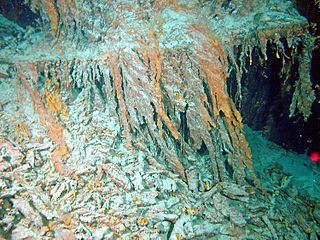Related Research Articles

Acidobacteriota is a phylum of Gram-negative bacteria. Its members are physiologically diverse and ubiquitous, especially in soils, but are under-represented in culture.
Jeotgalicoccus is a genus of Gram-positive, facultatively anaerobic, and halotolerant to halophilic bacteria. The cells are coccoid. The genus is named after the Korean fish sauce jeotgal, whence these bacteria were first isolated.

Halomonas titanicae is a gram-negative, halophilic species of bacteria which was isolated in 2010 from rusticles recovered from the wreck of the RMS Titanic. It has been estimated by Henrietta Mann, one of the researchers that first isolated it, that the action of microbes like Halomonas titanicae may bring about the total deterioration of the Titanic by 2030. While the bacteria have been identified as a potential danger to oil rigs and other man-made objects in the deep sea, they also have the potential to be used in bioremediation to accelerate the decomposition of shipwrecks littering the ocean floor.
Psychrobacter nivimaris is a Gram-negative, oxidase- and catalase-positive, aerobic, nonmotile bacterium of the genus Psychrobacter, which was isolated from the Southern Ocean.
Aurantiacibacter atlanticus is a Gram-negative, rod-shaped and motile bacteria from the genus Aurantiacibacter which has been isolated from deep-sea sediments from the Atlantic Ocean. Erythrobacter atlanticus has the ability to degrade polycyclic aromatic hydrocarbons.
Marinobacter lacisalsi is a Gram-negative, non-spore-forming, aerobic and moderately halophilic bacterium from the genus of Marinobacter which has been isolated from the lake from Fuente de Piedra in Spain.
Polaribacter is a genus in the family Flavobacteriaceae. They are gram-negative, aerobic bacteria that can be heterotrophic, psychrophilic or mesophilic. Most species are non-motile and species range from ovoid to rod-shaped. Polaribacter forms yellow- to orange-pigmented colonies. They have been mostly adapted to cool marine ecosystems, and their optimal growth range is at a temperature between 10 and 32 °C and at a pH of 7.0 to 8.0. They are oxidase and catalase-positive and are able to grow using carbohydrates, amino acids, and organic acids.
Celeribacter indicus is a bacterium from the genus of Celeribacter which has been isolated from deep sea sediments from the Indian Ocean.Celeribacter indicus can degrade polycyclic aromatic hydrocarbons.
Paraglaciecola oceanifecundans is a bacterium from the genus of Paraglaciecola which has been isolated from the Southern Ocean.
Arenibacter catalasegens is a Gram-negative, aerobic, rod-shaped and non-motile bacterium from the genus of Arenibacter which has been isolated from surface sediments from the Southern Indian Ocean.
Roseivirga pacifica is a Gram-negative, aerobic and moderately halophilic bacterium from the genus of Roseivirga which has been isolated from seawater from a depth of 2672 m from the Pacific Ocean.
The Temperatibacteraceae are a family of bacteria.
Rhodothermus is a genus of bacteria.
Oceanihabitans is a genus of marine bacterium in the family Flavobacteriaceae. It contains a single species, O. sediminis. It is aerobic, Gram-negative, rod-shaped, and motile by gliding. O. sediminis produces flexirubin pigments. It is positive for cytochrome c oxidase and catalase. O. sediminis can use glucose, mannose, maltose and adipic acid as sole carbon sources for chemoheterotrophic growth. It is a chemoorganotroph and is chemotaxonomically characterized by the presence of menaquinone 6 (MK-6). The type strain is S9-10T.
Olleya algicola is a Gram-negative, strictly aerobic, rod-shaped and motile bacterium from the genus of Olleya which has been isolated from the alga Ulva fenestrata from the Pacific.
Olleya aquimaris is a Gram-negative and motile bacterium from the genus of Olleya which has been isolated from seawater from the Baekdo harbour from the Sea of Japan.
Olleya namhaensis is a Gram-negative, rod-shaped and motile bacterium from the genus of Olleya.
Wocania ichthyoenteri is a Gram-negative, strictly aerobic and rod-shaped bacterium from the genus of Wocania which has been isolated from the intestine of the fish Paralichthys olivaceus.
Brevibacterium limosum is a bacterium from the genus of Brevibacterium which has been isolated from ocean sediments.
References
- 1 2 "Species: Olleya marilimosa". LPSN.DSMZ.de.
- 1 2 Nichols, Carol Mancuso; Bowman, John P.; Guezennec, Jean (1 July 2005). "Olleya marilimosa gen. nov., sp. nov., an exopolysaccharide-producing marine bacterium from the family Flavobacteriaceae, isolated from the Southern Ocean". International Journal of Systematic and Evolutionary Microbiology. 55 (4): 1557–1561. doi: 10.1099/ijs.0.63642-0 . PMID 16014481.
- ↑ "Olleya marilimosa". www.uniprot.org.